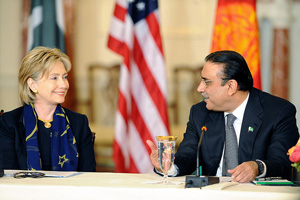I mean, you couldn’t make this stuff up. In fact, if I were to offer a conspiracy theory to explain it, I might suggest that the US government now exists mainly to feed material to The Daily Show. I’m referring to an article in the New York Times reporting that “the Obama administration and the Department of Defense have ordered the hundreds of thousands of federal employees and contractors not to view the secret cables and other classified documents published by Wikileaks and news organizations around the world unless the workers have the required security clearance or authorization.”
Don’t laugh. No, really, stop it!
Honestly, it’s perfectly sensible. Secrecy being such an all-encompassing value for our government, why shouldn’t its employees work in the dark, even when the rest of us, the rest of the world, knows what’s going on. Fortunately, I’m not an employee of the US government or its military-industrial contractors; so, though Raytheon, the Library of Congress, and other places have been thoughtful enough to try to minimize the pain of the ongoing Wikileaks dump of State Department documents by blocking people from reading them, and the Obama administration and assorted Internet crews, including Amazon and PayPal, are trying to ensure that there won’t be a fourth, fifth, or sixth round of dumps, I’ve been wandering the Web like any 12-year-old reading around.
You want to know what struck me? Something small. And it happened in Yemen, that anything-goes country whose president Ali Abdullah Saleh gave Washington almost carte blanche to act militarily—”an open door on terrorism,” as he put it to Obama’s Deputy National Security Adviser John Brennan in September 2009 (according to one of the State Department documents Wikileaks released). More like an open bomb bay, actually. And Saleh was even eager to take credit for those bombs we were dropping. “We’ll continue saying the bombs are ours, not yours,” he told then-Centcom commander General David Petraeus last January.
In return for the right to drop bombs and launch missiles, the Yemeni president got his own “open door”—directly into the US Treasury: tons of money (it’s euphemistically called “aid”) shoveled his way, US trainers and training for his troops, and lots of fancy military equipment because, let’s face it, Washington is still laboring in a coalition-of-the-billing, not a coalition-of-the-willing world. Still, even for Saleh, there were limits and—it’s so Washington 2010 of us—we nonetheless tried to exceed them. According to that State Department document, Petraeus evidently wanted to get US troops—probably Special Operations forces—on the ground in combat areas with Yemeni units. According to a State Department observer, “Saleh reacted coolly, however, to the General’s proposal to place USG [US Government] personnel inside the area of operations armed with real-time, direct feed intelligence from US ISR [Intelligence, Surveillance, and Reconnaissance] platforms overhead.”
In other words, anywhere we have a foot in the door of war, the next thing you know we’re trying to slip a (uniformed) body through it as well. That catches the American way of war these days and helps explain why we always seem to end up more, not less involved, in conflict in distant lands. Among the places where the US offers big dollars for the right to blast the hell out of things, Yemen is actually a Johnny-come-lately. Only recently have American officials made Sana’a, its capital, a Club Med for recreational bombing.
On the other hand, ever since Deputy Secretary of State Richard Armitage marched into the office of Pakistani autocrat General Pervez Musharraf soon after the 9/11 attacks and reportedly told him that the US would bomb his country “back to the Stone Age” unless he joined the fight against al-Qaeda, that country has been a magnet for Washington’s top brass, military and civilian. Chairman of the Joint Chiefs Admiral Mike Mullen had visited 16 times by early 2010 and sometimes there seems to be a greater density of American officials, wheedling, bribing, threatening, cajoling, and maneuvering in Islamabad, the Pakistani capital, than in Washington itself. Meanwhile, the CIA’s drones have been attacking Pakistani territory, its helicopters crossing the border shooting, its Special Operations troops on the ground, and the CIA swarming, as Washington acts with relative impunity in that land.
Fatima Bhutto, whose father, a member of Pakistan’s parliament, was killed by the police in 1996 during the premiership of his sister, Benazir Bhutto, offers an insider’s vision of just what impunity means in the Pakistani context. She has recently written a stirring memoir, an epic search for the truth behind her father’s life and death, Songs of Blood and Sword.
















